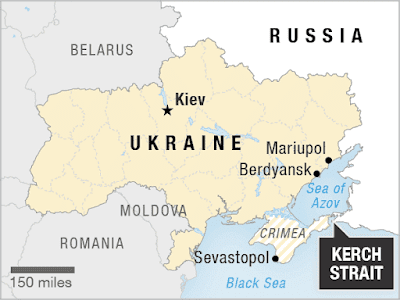Wednesday, December 22, 2021
There's been a lot of talk lately about the likelihood of Russia invading Ukraine, an issue that I discussed here last week. One point that I emphasized last week was that there are real differences between the respective value of the Crimea, which Russia annexed in 2014, and the value of eastern Ukraine, where the Russian government has been intervening ever since 2014.
In particular, I noted that, whereas there were real concrete benefits for Russia in invading and annexing the Crimea, the case for doing something similar in the rest of the Ukraine seems somewhat murkier. So what, exactly, would be the benefit to Russia if that country actually were to invade Ukraine?One possibility I've seen floated is that Putin wants to establish a "land bridge" between the Crimea and Russia, "a move which could be designed in part to free-up water resources blocked by Ukraine in the North Crimean Canal, which once accounted for up to 85% of the peninsula's water needs."
Ukrainian authorities cut off much of the water flowing into the Crimea following Russia's annexation of the peninsula, and in July of this year Russia filed a complaint against Kyiv in the European Court of Human Rights in connection to the water issue.
Crimean authorities have since 2014 been forced on occasion to ration water, and after a particularly harsh drought earlier this year, Moscow leveled the charge of genocide at Kyiv for its decision to block the canal. This week, the Kremlin accused Kyiv of ecocide as well.
All of this has forced Russia to invest hundreds of millions of dollars in Crimean water infrastructure, not only for the drinking and irrigation needs of the region's 2.5 million civilian residents, but also for the growing number of Russian naval personnel stationed there.
Without water from the Dnieper River, Crimea’s arable land has shrunk, from 130,000 hectares in 2013 — already a fraction of Soviet-era levels — to 14,000 in 2017. Thirsty crops like rice have shriveled.
And, in the words of a news story in the New York Times earlier this year:
This quiet spot just north of Crimea may not look like much. But some Ukrainians fear it could be the thing that ignites an all-out war with Russia.
“Putin could send his troops in here at any moment,” said Olha Lomonosova, 38, explaining why she had packed a getaway suitcase this year at her home upstream. “He needs water.”
The lesson, as always, is this: look beyond the stupid stuff that is typically invoked as a means of explaining behavior we don't understand--things like "nationalism" or "restoring Russia's pride." Usually, people have good reasons for doing what they do, and the same is the case for the people running Russia today. Concrete, tangible, material interests are usually what is behind people's invocations relating to what they do, so it's important to look beyond the rhetoric.
At the same time, I'm not sure if water alone would necessarily be reason enough for Russia to invade Ukraine, an issue that I hope to get back to in a later post.
Also see:
The Not-So-Great Game: The US and Russia in Post-Soviet Space
Bad Idea Jeans: Ukraine Edition
Will He or Won't He: Putin and eastern Ukraine
Crimea and eastern Ukraine: Things Can Always Get Worse
***
More commentary, photos, and links can be found in the Borderlands Lounge.


No comments:
Post a Comment